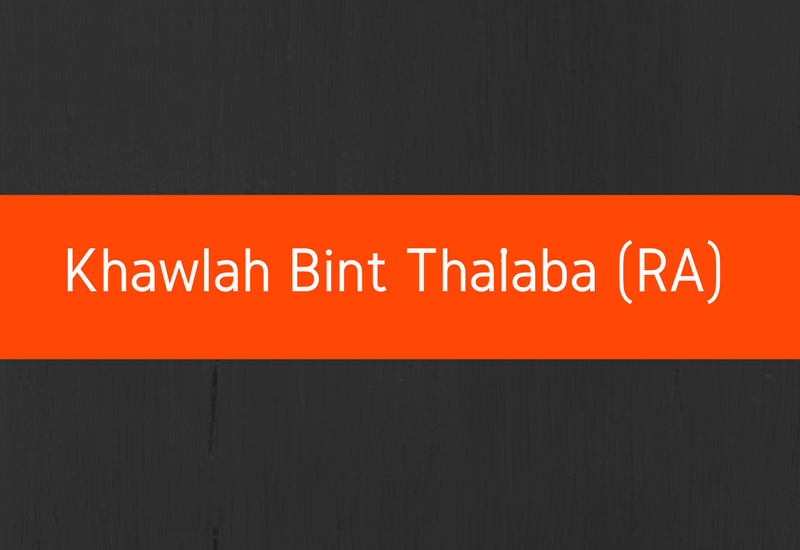Allah Responds To Her Prayer
Khawlah bint Tha’laba lived during the Prophet’s time in Medina. She was married to Aws ibn As-Samit. One day they had an argument. Aws divorced her by “Thihar,” a pagan custom of divorcing a wife by saying, “Be to me as my mother’s back.” This custom was degrading to women. It freed the husband of his responsibilities towards his wife and kids and prevented the wife from remarrying.
Khawlah visited the Prophet (pbuh) to seek guidance about her situation. When he advised her to be patient, she felt compelled to pray to Allah (swt) for more guidance. Allah responded to her prayer by revealing the first four verses of Surah Al Mujadila, “The Pleading Woman:”
Certainly has Allah heard the speech of the one who argues with you, [O Muhammad], concerning her husband and directs her complaint to Allah . And Allah hears your dialogue; indeed, Allah is Hearing and Seeing.
Those who pronounce thihar among you [to separate] from their wives – they are not [consequently] their mothers. Their mothers are none but those who gave birth to them. And indeed, they are saying an objectionable statement and a falsehood. But indeed, Allah is Pardoning and Forgiving.
And those who pronounce thihar from their wives and then [wish to] go back on what they said – then [there must be] the freeing of a slave before they touch one another. That is what you are admonished thereby; and Allah is Acquainted with what you do.
And he who does not find [a slave] – then a fast for two months consecutively before they touch one another; and he who is unable – then the feeding of sixty poor persons. That is for you to believe [completely] in Allah and His Messenger; and those are the limits [set by] Allah . And for the disbelievers is a painful punishment. (Holy Quran, 58: 1-4)
Aisha (ra) recounts the story in the following sahih hadith:
“Blessed is the One Whose hearing encompasses all things. I heard some of the words of Khawlah bint Tha’labah, but some of her words were not clear to me, when she complained to the Messenger of Allah (ﷺ) about her husband, and said: ‘O Messenger of Allah, (ﷺ) he has consumed my youth and I split my belly for him (i.e., bore him many children), but when I grew old and could no longer bear children he declared Zihar upon me; O Allah, I complain to You.’ She continued to complain until Jibra’il brought down these Verses: ‘Indeed Allah has heard the statement of she who pleads with you (O Muhammad) concerning her husband, and complains to Allah” (Sahih Ibn Majah).
Khawlah’s complaint was supported by Allah. The unjust custom of Thihar was banned.
Related: Hazrat Aisha (RA)
Khawlah’s Forgiving and Magnanimous Response
The scholar Ibn Kathir gives more details about Khawlah’s magnanimous response in his tafsir of Surah Al-Mujadila.
After the revelation of the four verses, the Prophet said to Khawlah, “Command him (her husband) to free a slave.”
Khawlah replied, “O Allah’s Messenger! He does not have any to free.”
Then the Prophet said, “Let him fast for two consecutive months.”
Khawlah replied, “By Allah! He is an old man and cannot fast.”
Then he said, “Let him feed sixty poor people with a Wasq of dates.”
Khawlah said, “Oh Allah’s Messenger! By Allah, he does not have any of that.”
The Prophet said, “We will help him with a basket of dates.”
Khawlah replied, “And I, O Allah’s Messenger! I will help him with another.”
The Prophet said, “You have done a righteously good thing. So go and give away the dates on his behalf and take care of your cousin.” And she did just that.
Related: Hazrat Bilqis (RA)
The Rights and Roles of Muslim Women
Khawlah’s story teaches many valuable lessons about women’s rights and roles in Islam.
Muslim women have the right to be treated with respect and justice by their husbands. Aws’ injustice to his wife was a serious offense in the sight of Allah–so serious that it warranted a penalty of freeing a slave, fasting for two consecutive months, or feeding 60 poor people.
Muslim women have the right and duty to seek justice when they have been treated unjustly. Khawlah stood up for her rights and her dignity. She took action when she was treated wrongly. Allah honored her for standing up for her rights.
Muslim women should turn to Allah whenever they have a problem. Khawlah’s story reminds us that we should call on Allah directly. Her story is proof of Allah’s statement, “Call on Me, I will respond to you” (40:60).
Muslim women & men should hold to forgiveness and compassion even when they are wronged. Khawlah forgave her husband and even helped him to pay the charity that he owed for his sin! She showed him compassion even though he had wronged her. She is a true heroine.
Ibn Kathir mentions in his tafsir that one day a man saw the caliph Umar (r) welcoming Khawlah warmly and listening to her. The man asked him, “You left a man of Quraish to come to this old woman?” Umar answered, “Woe to you! Do you not know who this is?” The man said, “No.” Umar said, “This is a woman whose complaint Allah listened to from above the seven heavens: this is Khawlah bint Tha’labah. By Allah, if she did not leave me until night fell, I would not tell her to leave until she had got what she came for, unless the time for prayer came, in which case I would pray, and then come back to her until she had got what she came for.”
>> Understand the Quran in as little as 10 minutes/day. Click here to learn more
Related: Hazrat Maryam (RA)




Leave a Reply